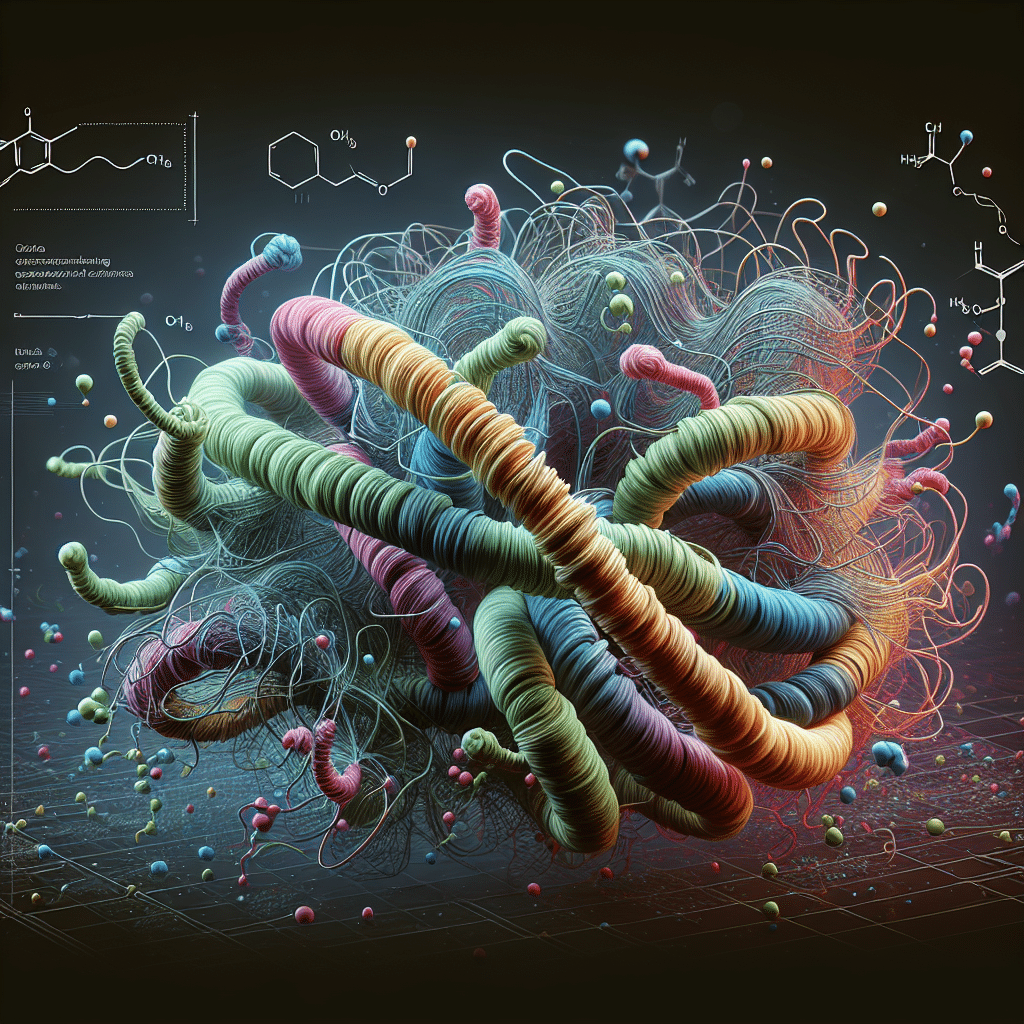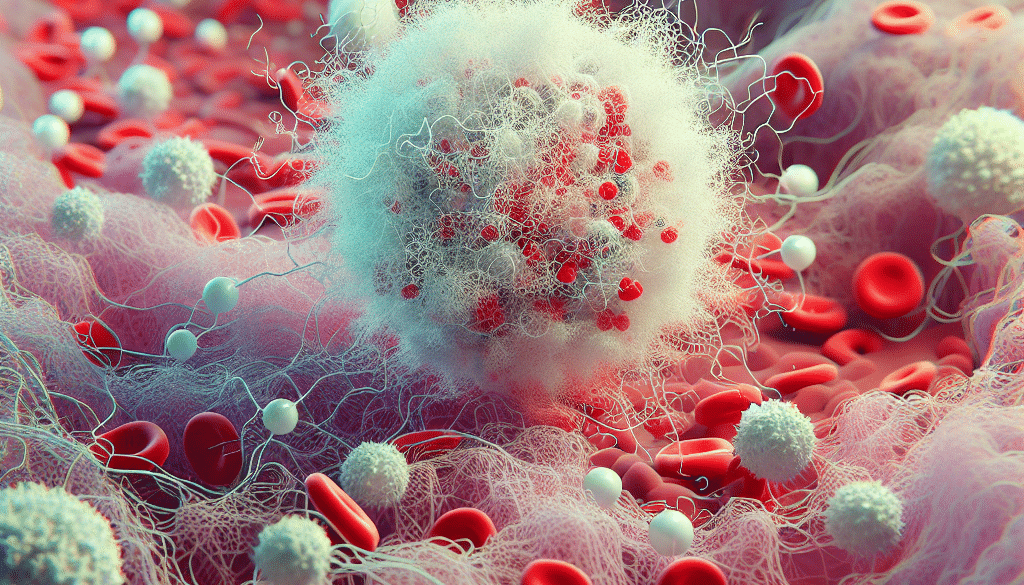Soluble Protein Threads: Key to Understanding Fibrin Formation
-
Table of Contents
- Soluble Protein Threads: The Foundation of Fibrin Formation
- Understanding Fibrin Formation
- The Role of Soluble Protein Threads in Hemostasis
- Factors Influencing Fibrin Formation
- Pathological Conditions and Fibrin Formation
- Advancements in Fibrin Formation Research
- Case Studies and Clinical Applications
- Conclusion: The Significance of Soluble Protein Threads in Medicine
- Discover ETprotein’s High-Quality Protein Products
Soluble Protein Threads: The Foundation of Fibrin Formation

The intricate process of blood clotting is a vital mechanism in the human body, essential for preventing excessive bleeding during injuries. At the heart of this process lies fibrin formation, a complex biological event that involves the transformation of soluble protein threads into an insoluble fibrin mesh. Understanding the nuances of fibrin formation is not only crucial for comprehending how our bodies respond to injury but also for developing treatments for a range of clotting disorders. This article delves into the science behind soluble protein threads and their role in fibrin formation, offering insights into the latest research and applications in the field.
Understanding Fibrin Formation
Fibrin formation is the final step in the blood coagulation cascade, a series of reactions that lead to the formation of a blood clot. This process is initiated when blood vessels are damaged, triggering the release of clotting factors that ultimately convert fibrinogen, a soluble plasma protein, into insoluble fibrin threads. These threads weave together to form a stable mesh that acts as a temporary plug to seal wounds and prevent further blood loss.
The Role of Soluble Protein Threads in Hemostasis
Soluble protein threads, primarily composed of fibrinogen, play a pivotal role in hemostasis, the process that stops bleeding. Fibrinogen circulates in the blood in a soluble form until it is activated by thrombin, a key enzyme in the coagulation cascade. Once activated, fibrinogen molecules undergo structural changes, converting into fibrin monomers that spontaneously aggregate to form insoluble fibrin fibers.
- Fibrinogen Activation: The conversion of fibrinogen to fibrin is a critical step in clot formation.
- Fibrin Polymerization: Fibrin monomers polymerize to form long, sticky threads that cross-link to create a stable network.
- Clot Retraction: Platelets within the clot contract, pulling the fibrin threads closer together to compact the clot and reduce the size of the wound.
Factors Influencing Fibrin Formation
Several factors can influence the formation of fibrin, affecting the efficiency and stability of blood clots. These include:
- Concentration of Clotting Factors: The levels of fibrinogen and other clotting factors in the blood can determine the speed and strength of clot formation.
- Presence of Inhibitors: Natural anticoagulants in the blood, such as antithrombin and protein C, help regulate clot formation to prevent excessive clotting.
- Genetic Variations: Genetic mutations can affect the structure and function of clotting factors, leading to disorders such as hemophilia or thrombophilia.
- Environmental Factors: Conditions such as pH and temperature can impact the enzymatic activity involved in fibrin formation.
Pathological Conditions and Fibrin Formation
Abnormal fibrin formation can lead to various pathological conditions, ranging from bleeding disorders to thrombotic diseases. Hemophilia, for example, is characterized by a deficiency in specific clotting factors, resulting in poor fibrin formation and excessive bleeding. Conversely, conditions like deep vein thrombosis (DVT) and pulmonary embolism (PE) are caused by the formation of abnormal clots that can obstruct blood vessels and lead to serious complications.
Advancements in Fibrin Formation Research
Recent advancements in the field of fibrin formation research have shed light on the molecular mechanisms underlying clot formation and dissolution. Innovative imaging techniques and molecular biology tools have allowed scientists to visualize fibrin threads at the nanoscale and understand the dynamics of fibrin polymerization and degradation. These insights are crucial for developing targeted therapies for clotting disorders.
Case Studies and Clinical Applications
Clinical case studies have demonstrated the importance of regulating fibrin formation in various medical scenarios. For instance, during surgical procedures, controlling bleeding is paramount, and understanding fibrin formation has led to the development of hemostatic agents that can enhance clot stability and reduce blood loss. Additionally, in the treatment of stroke patients, drugs that can dissolve fibrin clots (thrombolytics) are used to restore blood flow to the brain.
Conclusion: The Significance of Soluble Protein Threads in Medicine
In conclusion, soluble protein threads are the building blocks of fibrin formation, a critical process in the body’s response to injury. The ability to regulate this process has significant implications for treating a wide range of medical conditions, from genetic bleeding disorders to acquired thrombotic diseases. Ongoing research and development in this field hold the promise of more effective therapies and improved patient outcomes.
Discover ETprotein’s High-Quality Protein Products
For those in the nutraceutical and pharmaceutical industries seeking high-quality protein sources, ETprotein offers a range of plant-based protein products. Their commitment to non-GMO, allergen-free, and neutral-tasting ingredients makes them an excellent choice for various applications, including health and wellness products, sports nutrition, and dietary supplements.
About ETprotein:
ETprotein, a reputable plant protein vegan protein Chinese factory manufacturer and supplier, is renowned for producing, stocking, exporting, and delivering the highest quality organic bulk vegan protein and plant proteins. They include Organic rice protein, clear rice protein, pea protein, clear pea protein, watermelon seed protein, pumpkin seed protein, sunflower seed protein, mung bean protein, peanut protein etc. Their offerings, characterized by a neutral taste, non-GMO, allergen-free attributes, cater to a diverse range of industries. They serve nutraceutical, pharmaceutical, cosmeceutical, veterinary, as well as food and beverage finished product distributors, traders, and manufacturers across Europe, USA, Canada, Australia, Thailand, Japan, Korea, Brazil, and Chile, among others.
ETprotein specialization includes exporting and delivering tailor-made protein powder and finished nutritional supplements. Their extensive product range covers sectors like Food and Beverage, Sports Nutrition, Weight Management, Dietary Supplements, Health and Wellness Products, and Infant Formula, ensuring comprehensive solutions to meet all your protein needs.
As a trusted company by leading global food and beverage brands and Fortune 500 companies, ETprotein reinforces China’s reputation in the global arena. For more information or to sample their products, please contact them and email sales(at)ETprotein.com today.












